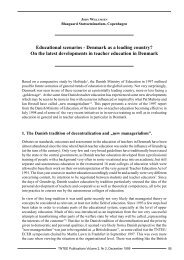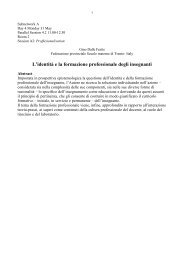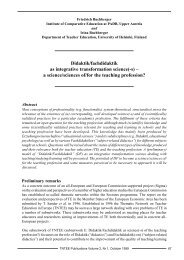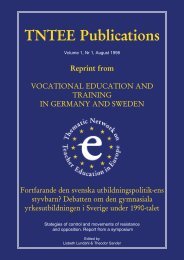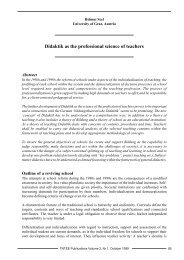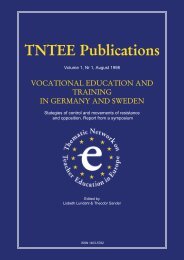TNTEE Publications - Didaktik/Fachdidaktik
TNTEE Publications - Didaktik/Fachdidaktik
TNTEE Publications - Didaktik/Fachdidaktik
Create successful ePaper yourself
Turn your PDF publications into a flip-book with our unique Google optimized e-Paper software.
Seeking connections between different perspectives on teacher education<br />
suggests the need to enlarge our notion of science to cover the “know-hows” associated with growing<br />
food or making tools, “so that we can grant that our ancestors were also “scientists’”. There are<br />
parallels with social practice theory in such a perspective. Gattegno argues that all sciences begin<br />
with a new awareness – “of light, or sound, or, in the case of mathematics, of relations as such”.<br />
Tahta proceeds to argue that the science of education” is concerned with the awareness of awareness<br />
itself”:<br />
… with listening and not with sounds, with touching and not with what is being touched,. With<br />
tasting and not with the cause of the taste, with smelling and not with the atoms which reach one’s<br />
nose.<br />
(Gattegno, 1987)<br />
He proceeds to direct your attention as the reader of the text by asking you to let yourself become<br />
conscious of your reading, as you read these words. “Do your eyes flicker? Do you take in chunks<br />
at a time? What images do you invoke? Are you with the reading? Are you now with the self that<br />
was with the reading?” He quotes Gattegno who argues that when “watchfulness” becomes second<br />
nature and one is able to adjust immediately to the “subtle demands of consciousness” then it is<br />
possible to say that one is a scientist in the science of education.<br />
So, argues Tahta, “the science of education uses aspects of watchfulness as its tools and a process of<br />
continuous feedback as its verification”. This is resonant with Imsen’s (1999) idea of the ‘learning<br />
circle’ which is itself consistent with the action research cycle of planning, action, observation and<br />
reflection which has been used widely and effectively by practitioners in the UK. An important role<br />
for the teacher according to Gattegno is in “forcing awareness”. This has echoes of the role of the<br />
teacher in Vygotsky’s ZPD. It is addressed explicitly by Tahta who quotes Simon (1985) as claiming<br />
that “the ideals of universal education are floundering for the lack of a pedagogy that emphasises<br />
what children have in common as opposed to their individual uniqueness.” This is interpreted as a<br />
call for “a science of education” and he proceeds as follows:<br />
There seem to be two competing choices. Either we continue to enquire what children can do as<br />
individuals and then create ‘learning environments’ in which they can create their own mathematics,<br />
and so on. Or – and this may be unpalatable to some readers – we try to find out what it is that all<br />
children have done and can do, and then teach them – in groups – in a more directed and sustained<br />
way.<br />
(Tahta, 1988)<br />
Tahta also discusses “ways of knowing” and gives the example of “intuition” which is illustrated in<br />
relation to the use of geoboards, cuisenaire rods and mathematical films. He argues that intuition<br />
“demands the whole of one’s self” and that this is what is required when one meets and tries “to<br />
maintain complexity”. He argues that it operates in “precisely the opposite way to the ‘focusing’<br />
traditionally stressed in Western thought and education”.<br />
Discussion<br />
Two of the major issues raised by this discussion are the tensions between individualistic and social<br />
perspectives and those between fragmentation and integration (holism). The issues around the former<br />
have been the subject of much consideration in this paper and those related to the latter have been<br />
touched upon. In tracing the historical development of the separation of the German and American<br />
traditions, Kansanen (1995) cites Doyle and Westbury (1992) as the source of the quote, attributed<br />
to Ellen Lagemann, that “one cannot understand the history of education in the United States during<br />
<strong>TNTEE</strong> <strong>Publications</strong> Volume 2, Nr 1, October 1999 43



